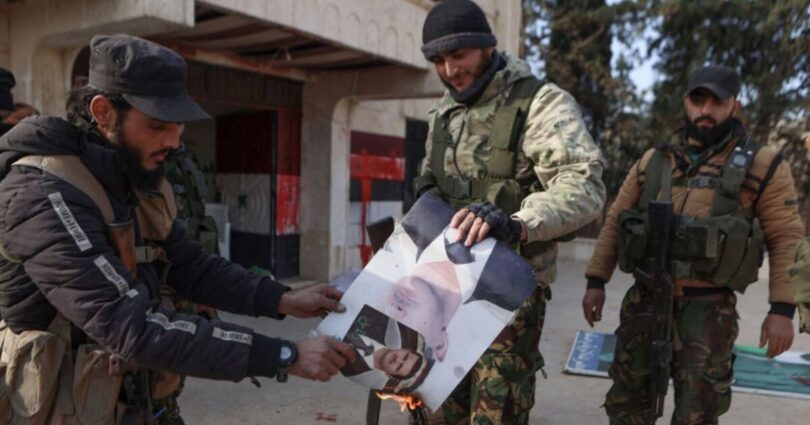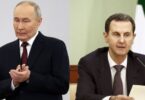The fall of Bashar al-Assad’s regime has ushered in a new era of uncertainty for the Middle East, with repercussions that stretch far beyond the region. For the United Kingdom, Syria’s disintegration is not just a distant crisis but a strategic challenge that demands urgent action.
Among the key regional actors, Israel’s role as a stabilising force cannot be overstated, and Britain must make it a priority to deepen its support for its ally in this increasingly fractured landscape. Yet, the actions and choices of other regional players, notably Jordan, also warrant close scrutiny, as they have contributed to the complexity of the situation.
The Hashemite Kingdom, long described as a steadfast British ally, has played a dangerous game in recent years — one that could now backfire dramatically.
For decades, Jordan has deftly navigated the volatile politics of the region, maintaining its stability amidst waves of turmoil. However, its role in tacitly tolerating, if not directly propping up, extremist movements like Hamas cannot be ignored. While Jordan has publicly condemned terrorism, it has also allowed the Muslim Brotherhood — Hamas’s ideological parent organisation — to wield significant influence within its borders, often using the group as a counterbalance to domestic political dissent.
By doing so, Amman has prioritised short-term internal stability over the long-term consequences of enabling Islamist networks. This strategy, while politically expedient, now faces a moment of reckoning.
The collapse of Assad’s regime has brought hordes of Islamic radicals to Jordan’s northern border, exacerbating an already precarious situation. Groups such as Hay’at Tahrir al-Sham (HTS) have capitalised on the power vacuum in Syria, their ambitions extending far beyond the Levant.
For Jordan, the presence of these forces so close to its borders poses a direct threat to its sovereignty and stability. The Hashemite Kingdom, long a beneficiary of Western aid and diplomatic support, may soon find itself facing the consequences of its own calculated ambivalence toward Islamist extremism.
What was once a controlled risk could now spiral into an existential challenge. For Britain, Jordan’s precarious position presents both a challenge and an opportunity.
As a historic ally, Jordan remains a critical partner in the region, but its complicity in enabling Islamist movements cannot go unaddressed. Britain must strike a delicate balance, continuing to support Jordan in its fight against extremism while urging Amman to adopt a more unequivocal stance against groups like Hamas and the Muslim Brotherhood.
The Hashemite Kingdom’s choices are no longer just a matter of internal politics; they have become a critical factor in the broader security dynamics of the Middle East.
Israel, by contrast, offers Britain a far more reliable partnership. While Jordan has played a dangerous game of double-dealing with Islamist factions, Israel has consistently acted as a bulwark against the region’s most destabilising forces. In the aftermath of Assad’s fall, Israel faces a northern frontier rife with threats, from Iranian-backed militias to jihadist factions like HTS.
Over the weekend, the Israel Defence Forces (IDF) launched preemptive operations near the Golan Heights to establish a buffer zone and contain the chaos spilling over from Syria. Such actions underscore Israel’s commitment to securing not only its own borders but also the broader region against the tide of extremism.
Britain must unequivocally support these efforts, recognising that a strong and secure Israel is indispensable to Middle Eastern stability.
The broader implications of Assad’s fall also extend to Iran, which has long used Syria as a linchpin in its “Axis of Resistance.” The collapse of the Assad regime has dealt a severe blow to Tehran’s ambitions, weakening its supply lines to Hezbollah and its foothold in the Levant.
However, Iranian-backed militias remain a significant threat, particularly in areas like Deir ez-Zor. For Britain, countering Iran’s influence must remain a priority, and this goal is best achieved through close coordination with Israel, whose intelligence and military capabilities are unmatched in the region.
Jordan’s increasingly tenuous position also raises questions about its future as a stabilising force. The influx of refugees and the proximity of jihadist factions pose existential challenges, and Britain must consider how best to engage with its longtime ally.
However, this engagement must come with clear expectations. The Hashemite Kingdom cannot continue to play both sides, appeasing Islamist movements while relying on Western support. Such duplicity is not sustainable in the face of the new threats emerging from Syria’s collapse.
Turkey’s aggressive actions in northern Syria further complicate the picture, particularly its hostility toward Kurdish autonomy and its support for Islamist factions aligned with its interests. For Britain, navigating the complex dynamics of its NATO ally will require careful diplomacy.
Yet, even here, Israel remains a more dependable partner in countering the chaos emanating from Syria and beyond. In this increasingly fragmented region, Britain must recognise that its strategic interests are best served by standing firmly with Israel.
The Jewish state is not just a stabilising force but also a vital ally in confronting the threats posed by jihadist extremism, Iranian
proxies, and regional instability. As the Middle East undergoes yet another seismic shift, Britain’s ability to act decisively in support of its allies will determine not only its role in the region but also its standing as a global power.
Jordan’s calculated ambivalence toward groups like Hamas and the Muslim Brotherhood has brought it to a crossroads. With Islamist radicals now at its doorstep, the Hashemite Kingdom may soon find that its strategy of appeasement was not only short-sighted but dangerously foolish.
For Britain, the lesson is clear: only by backing reliable partners like Israel and holding wavering allies accountable can it hope to shape a more stable and secure Middle East. The stakes could not be higher, and the time for clarity and conviction is now.
Catherine Perez-Shakdam is the Executive Director of We Believe in Israel & Forum for Foreign Relations
Source link








